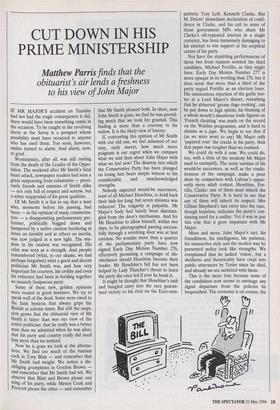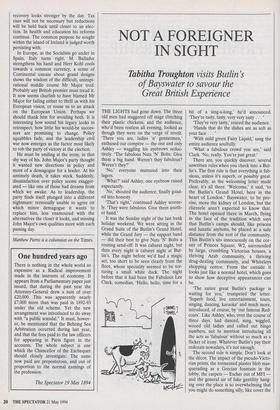CUT DOWN IN HIS PRIME MINISTERSHIP
Matthew Parris finds that the
obituarist's air lends a freshness to his view of John Major
IF MR MAJOR'S accident on Tuesday had not had the tragic consequence it did, there would have been something comic in the occasion. To be caught in the revolving doors at the Savoy is a prospect whose Possibility must have occurred to anyone Who has used them. Too soon, however, smiles turned to alarm. And alarm, now, to grief.
Westminster, after all, was still reeling from the death of the Leader of the Oppo- sition. The weekend after Mr Smith's fatal heart attack, newspaper readers had seen a great outpouring from columnists — previ- ously friends and enemies of Smith alike — not only full of respect and sorrow, but a sober reappraisal of his great qualities.
Of Mr Smith it is fair to say that a man who, moments before his passing, had been — in the opinion of many commenta- tors — a disappointing parliamentary per- former, politically bogged down and hampered by a native caution bordering at times on timidity and at others on inertia, was now judged in a new light. The wis- dom in his caution was recognised. His calm was seen as a strength. And people remembered (what, to our shame, we had perhaps forgotten) what a good and decent politician Mr Smith was, and how very important his courtesy, his civility and even his reticence had been in holding together an innately fissiparous party.
Some of these new, golden opinions were rooted in good manners. We try to Speak well of the dead. Some were owed to the faint hysteria that always grips the British at solemn times. But still the suspi- cion grows that the obituarial view of Mr Smith is fairer than was our view of the active politician: that he really was a better man than we admitted when he was alive; that his party and country really did need him more than we noticed.
Now he is gone we look at the alterna- tives. We find too much of the bantam cock in Tony Blair — and remember that Mr Smith had weight. We notice a dis- obliging grumpiness in Gordon Brown — and remember that Mr Smith had wit. We Observe that Blair and Brown please one Wing of his party, while Messrs Cook and Prescott please the other — and remember that Mr Smith pleased both. In short, now John Smith is gone, we find he was provid- ing much that we took for granted. This finding is more than a courtesy to his widow. It is the likely view of history.
If, contrasting this opinion of Mr Smith with our old one, we feel ashamed of our easy, early sneers, how much more poignant is our regret when we compare what we said then about John Major with what we feel now! The disarray into which the Conservative Party has been plunged on losing him bears simple witness to his considerable and unacknowledged strengths. Nobody expected would-be successors, least of all Michael Heseltine, to hold back their bids for long: but seven minutes was indecent! The vulgarity is palpable. Mr Major's body had barely been disentan- gled from the door's mechanism. And for Mr Heseltine to allow himself, within two days, to be photographed passing success- fully through a revolving door was at best careless. No wonder more than a quarter of the parliamentary party have now signed Early Day Motion Number 276, effectively promising a campaign of dis- obedience should Heseltine become their leader. Mr Heseltine's bid has not been helped by Lady Thatcher's threat to leave the party she once led if ever he leads it. It might be thought that Heseltine's rash and bungled entry into the race guaran- teed victory to his rival on the Euro-sym- pathetic Tory Left: Kenneth Clarke. But M. Delors' immediate declaration of confi- dence in Clarke, and his call to arms of those government MPs who share Mr Clarke's oft-repeated interest in a single currency, has been immensely damaging to his attempt to win support at the sceptical centre of his party.
Nor have the stumbling performances of those two front runners assisted the third candidate, Michael Portillo, as they might have. Early Day Motion Number 277 is more opaque in its wording than 276, but it does seem that more than a third of the party regard Portillo as an election loser. His ostentatious rejection of the garlic but- ter at a Lord Mayor's dinner, remarking that he abhorred 'greasy dago cooking', can be put down to high spirits; his blaming of a whole month's disastrous trade figures on 'French cheating' was made on the record on the Walden programme, and is hard to dismiss as a jape. We begin to see that if (as we were wont to say) Mr Major only 'papered over' the cracks in his party, then that paper was tougher than we realised.
We could do with it now. We could do, too, with a little of the modesty Mr Major used to exemplify. The noisy vanities of his would-be successors, as well as the vindic- tiveness of the campaign, make a poor show by comparison with Labour's appar- ently more adult contest. Heseltine, Por- tillo, Clarke: one of them must inherit the Conservative Party. It is hard to see that any of them will inherit its respect. Mrs Gillian Shephard's late entry into the race, though hopeless, indicates the party's con- tinuing need for a unifier. Yet it was in just this role that it grew impatient with Mr Major.
More and more, John Major's tact, his friendliness, his intelligence, his patience, his unassertive style and the modest way he presented policy look like strengths. We complained that he lacked 'vision', but a shrillness and theatricality have crept into public utterances by Tories since he died, and already we are surfeited with them.
This is the more true because none of the candidates now seems to envisage any signal departure from the policies he bequeathed. The economy is on course; the recovery looks stronger by the day. Tax rises will not be necessary but reductions will be held back until closer to an elec- tion. In health and education his reforms continue. The common purpose he sought within the island of Ireland is judged worth persisting with.
In Europe, as the Socialists go under in Spain, Italy turns right, M. Balladur strengthens his hand and Herr Kohl cools towards a common currency, a sense of Continental unease about grand designs shows the wisdom of the difficult, uninspi- rational middle course Mr Major trod. Probably any British premier must tread it. It now seems churlish to have blamed Mr Major for failing either to thrill us with his European vision, or rouse us to an attack on the European Union. Perhaps we should thank him for avoiding both. It is interesting how sound his legacy looks in retrospect; how little his would-be succes- sors are promising to change. Policy squabbles fade, and the leadership civil war now emerges as the factor most likely to rob the party of victory at the election.
He must be smiling at the irony, in that shy way of his. John Major's party thought it wanted new directions in policy and more of a demagogue for a leader. At his untimely death, it takes stock. Suddenly, dissatisfaction over policy seems exagger- ated — like one of those bad dreams from which we awake. As to leadership, the party finds itself plunged into a different nightmare: terminally unable to agree on which minor demagogue it wants to replace him, less enamoured with the alternatives the closer it looks, and missing John Major's own qualities more with each passing day.
Matthew Parris is a columnist on the Times.





































































 Previous page
Previous page